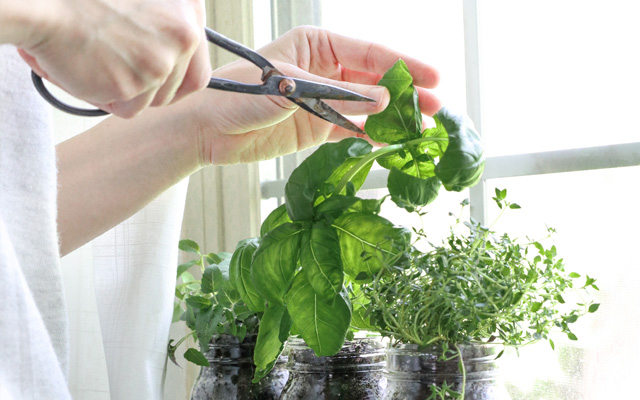The art of growing herbs in the kitchen has been a delightful practice for culinary enthusiasts and green thumbs alike. The beauty of cultivating your own basil, oregano, rosemary, and chives lies not just in the convenience but also in the fresh flavors these herbs bring to your cooking. This guide will walk you through the simple yet rewarding process of growing these herbs on your kitchen windowsill.
Why Choose These Herbs?
- Basil: Known for its fresh and peppery flavor, basil is a staple in Italian cuisine.
- Oregano: With its earthy and slightly bitter taste, oregano is essential in Greek and Mexican dishes.
- Rosemary: This aromatic herb, with its needle-like leaves, adds a woody essence to various dishes.
- Chives: Delicate in flavor, chives are excellent for adding a mild onion-like taste to salads and soups.
Getting Started
Selecting the Right Spot
- Sunlight: All these herbs thrive in plenty of sunlight. A south-facing windowsill that receives at least 6 hours of sunlight is ideal.
- Temperature: These herbs prefer a warm environment. Ensure the spot isn’t too drafty or subject to extreme temperature changes.
Choosing Containers
- Drainage: Opt for pots with adequate drainage to prevent waterlogging.
- Size: Ensure the pots are spacious enough for the herbs to grow but small enough to fit on your windowsill. Typically, a 6-inch pot for each herb works well.
Planting Your Herbs
Soil and Planting
- Soil Type: Use a high-quality, well-draining potting mix.
- Planting: You can start from seeds or purchase small plants from a nursery. Plant them in individual pots, burying the roots slightly in the soil.
Watering and Feeding
- Watering: Water the herbs when the top inch of the soil feels dry. Avoid overwatering.
- Feeding: Use a balanced, all-purpose liquid fertilizer every four to six weeks.
Specific Care Tips
Basil
- Pruning: Regularly pinch off the tips to encourage bushy growth.
- Harvesting: Harvest leaves as needed but avoid taking more than a third of the plant at one time.
Oregano
- Trimming: Trim back the stems to promote fuller growth.
- Drying: Oregano can be dried for long-term storage.
Rosemary
- Air Circulation: Ensure good air circulation around the rosemary plant to prevent fungal diseases.
- Watering: Allow the soil to dry out between waterings.
Chives
- Cutting: Cut the leaves from the base for a continuous supply.
- Flowering: Remove the flowers to conserve the plant’s energy for leaf growth.
Troubleshooting Common Problems
- Leggy Growth: This indicates insufficient light. Consider supplementing with grow lights.
- Yellowing Leaves: Overwatering is a common cause. Let the soil dry out more between waterings.
- Pests: Keep an eye out for aphids and spider mites. A gentle spray of water or insecticidal soap can help.
Conclusion
Growing basil, oregano, rosemary, and chives on your kitchen windowsill is not only practical but also immensely satisfying. These herbs not only add fresh flavors to your dishes but also bring a touch of greenery to your kitchen. With a little care and attention, you can enjoy the bounty of your mini herb garden all year round. Happy gardening!


